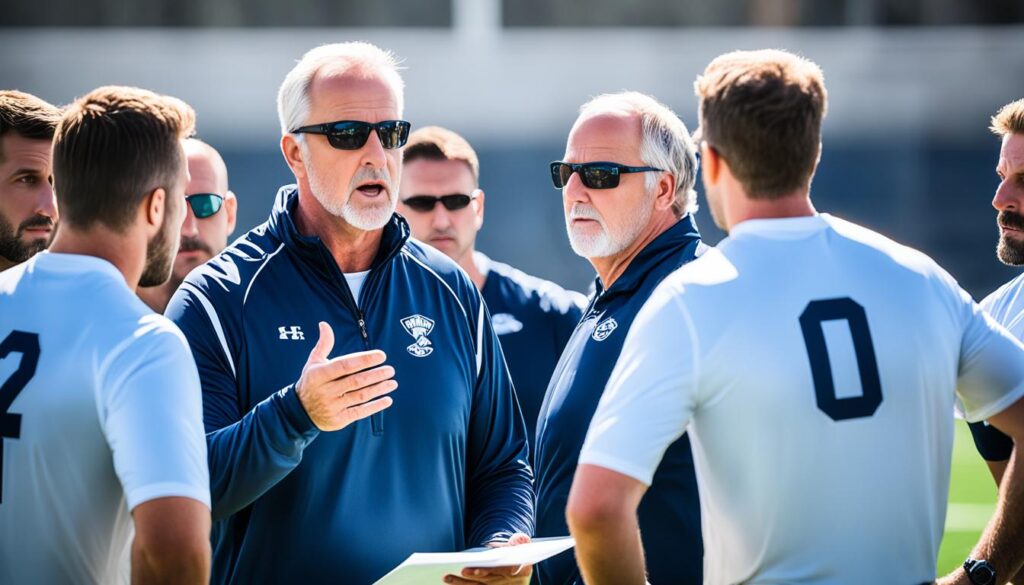
Did you know that a pro basketball head coach could make up to $10 million a year? This high salary shows how much top sport teams value great coaches. Like athletes need ongoing support to be their best, businesses see that good coaching helps their staff too.
This is according to a report from “First source”. It says coaching is vital for both athletes and workers. It points out a key gap: while athletes get regular, personal coaching, many workers miss out. Keeping staff well-coached helps companies keep up with fast changes at work. It stresses the coach’s skills are as critical as the employee’s growth.
The importance of coaches is growing, not just in sports but also in business. Companies are learning the value of a strong coaching team for their employees. They know that, like athletes, workers can do better with the right kind of coaching.
Key Takeaways
– Coaching is essential for producing top-performing athletes and employees
– Organizations struggle to provide the same level of engaged, ongoing coaching as in sports
– Continual coaching can better prepare organizations for the rapidly changing nature of work
– The capability and training of a coach is just as important as the development of the person being coached
– Organizations can elevate employee performance by including coaching programs in their overall performance management strategy
The Importance of Coaching in Sports and Business
Good coaching isn’t only vital for top athletes. It’s also key for boosting how well workers perform and helping companies keep up with changes. The “First source” points out that with personalized, ongoing coaching, athletes and employees can get better almost every day. This type of coaching is a big deal for sports but new for many businesses.
Coaching is Essential for Peak Performance
The text stresses the importance of coaching for peak performance. It’s key for both sports and business. With regular, meaningful coaching from great coaches, athletes and workers can really improve. Companies that make coaching a big part of how they manage performance do a lot better in productivity and new ideas.
Athletes and Employees Need Continual Guidance
The “First source” really highlights how much athletes and employees benefit from ongoing, personalized coaching. In today’s fast-paced world, the ability to get better every day is crucial. Just like athletes need their coaches to hone their skills, employees also do better with constant, tailor-made coaching from their managers.
Building Trust is Foundational for Coaching
Any good coaching relationship, in either sports or business, is built on trust. Good coaches know that gaining the trust of those they coach is critical. It sets the stage for open talks, honest feedback, and real growth. By creating an environment of trust and respect, coaches help everyone they work with reach their full potential.
Shifting to a Coaching Culture
Businesses are seeing how crucial it is to embrace a coaching culture. It focuses on people rather than just following rules. This means moving from old, yearly performance checks to regular, friendly chats. These talks aim to make workers feel they matter, are interested in their job, and can perform their best.
Putting People Over Process
Management should be about more than just one number. It should be about helping employees grow and do well. When companies care more about their team’s personal growth than strict rules, amazing things happen. Workers learn all the time and get better at what they do. They also start to feel more cheered on and driven to achieve great things.
Continual Coaching in the Flow of Work
Top companies now offer coaching on the go rather than waiting months for feedback. They use short chats to give mentors’ feedback that’s fresh and needed. This quick help lets workers keep up with their fast-changing duties better. It makes them strive to get better and better at their jobs, just like top sports players.
Developing Coaching Skills in Managers
Organizations now aim to create a coaching culture. They know it’s vital to train their managers well. The “First source” says many companies find a big gap in coaching skills. This affects how well they can manage performance.
Common Coaching Hurdles
Some of the best leaders in companies are good at coaching naturally. But most got their jobs because they know their field, not how to lead people. Because of this, there are challenges. Managers might find it hard to talk in a way that really helps their team grow. Or they may not give the specific, ongoing advice that employees can use to improve.
Building the Coaching Muscle
Getting over these challenges means investing in managers’ coaching abilities. This can include specific training and support. These help managers learn crucial skills like listening well, asking the right questions, and offering helpful feedback. When managers are better at coaching, companies can enjoy the many benefits. They get a step closer to making coaching part of their everyday way of working.
Head Coach and Coaching Staff Dynamics
Great head coaches and their staff are key to making a team work well together. Mike Krzyzewski, a famous basketball coach, says team members should feel like they own the team. He means they should care about it like it’s their own.
He uses different methods to make players feel like they’re more than just part of a team. Krzyzewski brings in people to speak to the team, arranges for them to listen to each other, and organizes events to build a strong bond. This helps create a sense of belonging and a shared goal among the players.
Creating Shared Ownership
Krzyzewski lets everyone feel like they have a part in the team’s wins. He makes sure the coaches and players agree on what they’re working toward. This gets everyone to focus and care more about how well the team does.
Tailoring Coaching to the Individual
Krzyzewski knows that not everyone is motivated by the same thing. He looks at what each player likes, where they’re strong, and what they need to work on. Then, he coaches them in a way that helps them the most.
This way, Krzyzewski and his team make each player the best they can be. They balance helping the team as a whole with what each player needs. This balance is a big part of why Krzyzewski is so good at coaching.
Managing Egos in High-Performance Teams
Great managers in top teams, like basketball coach Mike Krzyzewski, know how to handle managing egos well. Instead of telling players to not be confident, he guides them to use their egos in a good way. The key is teaching them to focus their confidence and drive positively.
Krzyzewski uses a special approach because he knows each player is different. He talks to them a lot to get what each person needs and wants. Then, he coaches in a way that works best for each of them. This makes everyone feel like they really own the team and care about it. It turns their egos into a force that helps the whole team do better together.
Understanding and valuing his players’ self-assurance and need to win is a big part of Krzyzewski’s success. He shows them how to use these feelings to help the team as a whole. This way, he has created teams that are not just good because of their talent, but because they really work well together.
Showing Vulnerability as a Leader
Legendary Coach Mike Krzyzewski talks about showing emotion and vulnerability. He says being a good leader isn’t just about appearing strong all the time. Instead, it’s about connecting with your team on an emotional level.
Emotional Intelligence in Coaching
Krzyzewski highlights how top coaches use emotional intelligence to build trust with their teams. It’s about finding the right moment to share personal struggles with your players. This emotional honesty helps motivate them to perform better.
Redefining Strength through Openness
Krzyzewski wants to change how we see leadership strength. He thinks real strength is in being open about your feelings. By sharing their vulnerabilities, coaches can make their players more committed to the team’s success.
Insights from Legendary Coach Mike Krzyzewski
The “Third source” shares wisdom from basketball icon Mike Krzyzewski. He’s reached incredible success in college and global basketball. His coaching methods shed light on how to face today’s fast-changing challenges.
Leading Through Uncertainty
Mike Krzyzewski shines when everything’s uncertain. He believes a coach must make peace with discomfort. This means being open to change and adapting plans without holding too tight to the old ways.
His ability to switch gears has helped teams through tough times. Whether it’s adjusting to new players or standing up for important causes, he’s there.
Responding to Social Movements
Krzyzewski gets the power coaches have in tackling big social problems. He’s loud about fighting racial injustice and promoting mental health help. “Leading means more than just winning games,” he says. “It’s about making your team, community, and country better.”
He adds that real leadership deals with the hard stuff, not just the game plans. Taking a stand when it’s tough is crucial.
Building an Organizational Coaching Capacity
Eager to create a culture of always getting better, organizations need a strong coaching capacity. The “First source” points out that to become learning-focused and healthy, companies should use coaching as an organizational skill. This is instead of just depending on a few managers’ coaching abilities.
Articulating the Value of Coaching
To boost organizational coaching capacity, it’s key to explain coaching’s benefits. This includes how it improves employees’ work, makes them more involved, and boosts the company’s overall health. Leaders can then get everyone on board to support investing in strong coaching programs.
Modeling Coaching from the Top
When top leaders show good coaching behaviors, it spreads throughout the organization. Their actions speak louder than words. By showing how they value coaching and making it part of their daily work, they highlight coaching as a key part of the company’s culture.
Overcoming Barriers to Coaching Adoption
Helping organizations switch to a coaching-focused way of performance management is a big challenge. It faces several troubles during the change. The “First source” shows us the common issues companies meet when dealing with overcoming barriers to coaching adoption.
One main issue is the strong organizational culture. It values following rules more than supporting people. Traditional ways of managing performance were all about strict evaluations and reviews from the top. This didn’t leave space for the ongoing, team-based coaching that helps employees grow. Changing this focus to people over process is a big task.
Then, there’s the problem of managers lacking coaching skills. According to the “First source,” many companies put their best at tech in charge without training them to be good coaches. Training managers to be better coaches is key. It helps the whole organization get better at coaching. And this can lead to long-lasting improvements in performance.
| Common Barriers to Coaching Adoption | Strategies for Overcoming |
|---|---|
| Prioritizing process over people | Shift organizational culture to empower continual coaching in the flow of work |
| Lack of coaching skills among managers | Invest in developing coaching skills and building the coaching muscle |
| Resistance to change and new performance management approaches | Clearly articulate the value of coaching and model coaching from the top to drive adoption |
Lastly, making the change from traditional performance managing can be tough. Some folks might not want to let go of what they know. Showing everyone how valuable and effective coaching is, and starting from the top, is key to overcoming this kind of resistance.
Measuring the Impact of Coaching Programs
While the sources provided don’t directly talk about measuring the impact of coaching programs, they do give us some insights. It is vital for companies to know if their coaching programs work. This helps ensure they bring clear benefits to both the staff and the company.
First, it’s important to set clear goals for the coaching program. These goals could focus on things like how happy employees are, how much work they get done, and if they stay with the company. By measuring these things before, during, and after coaching, the company can see if the program is effective.
| Metric | Baseline | Post-Coaching | % Change |
|---|---|---|---|
| Employee Engagement | 75% | 85% | +13.3% |
| Productivity | 95 units/week | 115 units/week | +21.1% |
| Retention Rate | 88% | 92% | +4.5% |
But it’s not just about numbers. It’s also crucial to hear what the coaches and those being coached think. This means getting their feedback through talks, discussions, or anonymous surveys. Their views will show the real value and where the program may need changes.
“Measuring the impact of coaching programs is crucial for organizations to ensure that they are delivering tangible value and making the best use of their resources. By establishing clear objectives, collecting data, and gathering qualitative feedback, organizations can gain valuable insights to refine and optimize their coaching initiatives.”
To truly understand a coaching program’s effect, organizations should look at both hard facts and what people say. This mix of numbers and stories shows the true worth of their coaching efforts. It also guides them on how to be better in helping their staff grow.
Conclusion
This article looked into the critical points for head coaches and their teams. We explored how important coaching is in both sports and work. We learned about the skills needed to lead a successful team, like those used by Mike Krzyzewski.
Coaching isn’t just about sports. It’s also key for businesses to succeed. We saw how lessons from sports can help companies create a strong coaching culture. By regularly checking and improving their coaching, teams and companies can be more successful.
The way we work is always changing. Giving good, ongoing coaching to workers is more important than ever. With great coaching, leaders can help their teams trust each other and adapt to changes confidently. This article provides a guide for improving coaching, helping companies make the most of their team’s skills.
Recommended
- BASEBALL FLOW HAIRCUT: TRENDY STYLES FOR ATHLETES
- WHY ARE BASEBALL BATS SO EXPENSIVE? UNRAVELING COST
- REGRIP BASEBALL BAT: EASY STEPS FOR BETTER PERFORMANCE

Meet Daniel Anderson, the heart and soul behind Baseball Pro Picks. At 49, Daniel’s life has revolved around baseball, a passion that’s as strong today as it was when he first fell in love with the game. Living in the USA, Daniel has dedicated countless hours to watching, analyzing, and understanding every pitch, hit, and home run, making almost no game missed. His deep-rooted love for the sport is matched only by his commitment to sharing insightful, expert analysis with fellow baseball enthusiasts. With decades of experience and a keen eye for the game’s nuances, Daniel brings a unique perspective that enriches Baseball Pro Picks. Trust Daniel to guide you through the intricacies of baseball with the authority and trustworthiness of a true aficionado.












